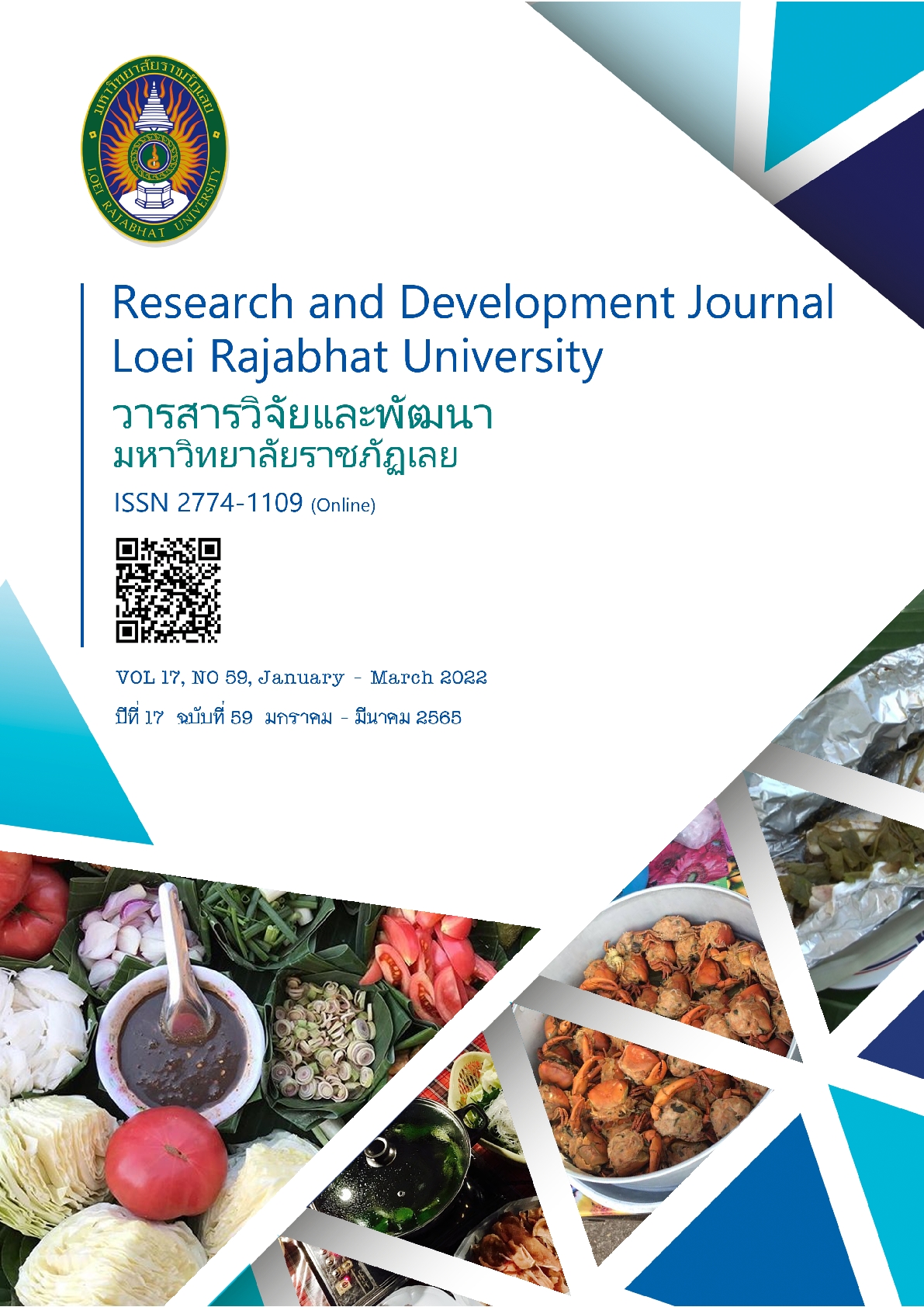Managing the Service Quality Gap of the Multinational Corporation Hotel Business Group at Hua Hin District, Prachuap Khiri Khan Province Amid the Crisis of the Third Wave of COVID-19 Pandemic
Keywords:
crisis management, service quality gap, hotel business of multinational corporations, COVID-19Abstract
This research aimed to: 1) study problems and limitations in the service quality management of hotel business groups of multinational corporations; and 2) analysis of service quality gap of the multinational hotel business. It is qualitative research using the phenomenological method. Data were collected through in-depth interviews from key informants who are experienced in hotel human resource management and development from five international hotel business groups, totaling 10 people. The finding found that: 1) Manpower reduction to maintain hotel costs, caused the problem of an insufficient number of service providers to service; and 2) The need of preparation to manage the gaps in the five aspects of service quality, which are: 2.1) the opinions of the clients that the hotel collected data on behaviour to be used to forecast and define service models; 2.2) design of service standards by implementing public health measures, both SHA: Amazing Thailand Safety & Health and each international network; 2.3) the potential of service providing through Work From Home and promoting the performance of service providers with the principles of Reskills and Upskills; 2.4) communication with public relations via social media along with the promotion activities with the government; and 2.5) on the perception of satisfaction through the form to collect comments on the service and survey information through the general website group.
References
การท่องเที่ยวแห่งประเทศไทย. (2563). แผนการดำเนินโครงการ แนวทางความปลอดภัยด้านสุขอนามัย. กรุงเทพฯ: ฝ่ายพัฒนาสินค้าการท่องเที่ยว ด้านสินค้าและธุรกิจท่องเที่ยว การท่องเที่ยวแห่งประเทศไทย.
จักรกฤษณ์ เหลืองเจริญรัตน์. (2564, 12 มีนาคม). โรงแรมหลังโควิด 19 ต้องดีไซน์อย่างไร. สืบค้นจาก https://www.terrabkk.com/articles/199544/-“โรงแรม”-หลังโควิด-19-ต้อง-“ดีไซน์”-อย่างไร-
จุฑามาส ปลื้มกลม, และ วิตติกา ทางชั้น. (2564). บริบทโรงแรมสำหรับรองรับกลุ่มนักท่องเที่ยวผู้สูงอายุในเขตภาคตะวันออกเฉียงเหนือ. ในบัณฑิตวิทยาลัย มหาวิทยาลัยขอนแก่น, รายงานสืบเนื่องการประชุมวิชาการเสนอผลงานวิจัยระดับบัณฑิตศึกษา ครั้งที่ 22. วันที่ 25 มีนาคม 2564 ภาคบรรยาย (น. 293-299). การประชุมวิชาการเสนอผลงานวิจัยระดับบัณฑิตศึกษา ครั้งที่ 22 มหาวิทยาลัยขอนแก่น, ขอนแก่น.
ญานิศา แก้วขำ, และ เจจิรา ราชบุตร. (2561). การวิเคราะห์ช่องว่างคุณภาพการให้บริการศุลกากรด้วยเครื่องมือ SERVQUAL กรณีศึกษาานศุลกากรเชียงของ (โครงงานการศึกษาตามหลักสูตรวิศวกรรมศาสตร์). มหาวิทยาลัยธุรกิจบัณฑิต, กรุงเทพฯ.
ฑิตาพร รุ่งสถาพร. (2562). พฤติกรรมผู้บริโภคต่อการซื้อสินค้าบนช่องทางออนไลน์ในภาวะวิกฤตโควิด-19 ในเขตกรุงเทพมหานคร ปริมณฑล และพิษณุโลก (การศึกษาอิสระปริญญามหาบัณฑิต). มหาวิทยาลัยกรุงเทพ, ปทุมธานี.
นฤมล อนุสนธิ์พัฒน์. (2563). การปรับตัวทางเศรษฐกิจด้านการท่องเที่ยวในสภาวะวิกฤตโควิด 19 ในประเทศไทย. วารสารวิชาการมนุษยศาสตร์และสังคมศาสตร์, 8(1), 1-26.
พรไพลิน จุลพันธ์. (2564, 9 เมษายน). โควิดรอบ 3 ฉุดรายได้ท่องเที่ยวสะพัดในช่วงสงกรานต์หายไปกว่า 2.4 พันล้านบาท. กรุงเทพธุรกิจ. สืบค้นจาก https://www.bangkokbiznews.com/news/detail/931584?fbclid=IwAR03i_J_TAOZUikhhEGuWGdbpLPY_TDGTojD4v-4YVeCX9h9xKhBfaNeONk
พรรณศา ธีระวงศ์สกุล. (2564). Traveler of Tomorrow Elite Travel Trends. TAT Review, 7(2), 27-33.
พัชรียา แก้วชู. (2563). ปัจจัยที่มีอิทธิพลต่อการเปลี่ยนแปลงพฤติกรรมการท่องเที่ยวแบบ New Normal หลังการแพร่ระบาดโควิด-19 (การศึกษาอิสระปริญญาบัณฑิต). มหาวิทยาลัยรามคำแหง, กรุงเทพฯ.
ระชานนท์ ทวีผล, กนกพร ธิตะโพธิ์, กรกนก ชัยศิลป์เจริญ, ณัฏฐฌิชา เบญจวานิช, ณิชชาภัทร ตั้งกุลธนวุฒิ และ ศิริวรรณ หากลิ่นดี. (2564). แนวทางการปรับเปลี่ยนและพัฒนาการบริการไร่องุ่นมอนซูนแวลลีย์ภายใต้สถานการณ์การแพร่ระบาดของเชื้อไวรัสโควิท-19. วารสารศิลปศาสตร์ มทร. กรุงเทพ, 3(1), 36-48.
วีณา บารมี. (2564, 12 เมษายน). ส่องไอเดียรับมือโควิด-19 ในธุรกิจท่องเที่ยวทั่วโลก. สืบค้นจาก https://onceinlife.co/travel-innovation-trends?fbclid=IwAR23yuHV3JDd2nJahMmdVgd6-lqPp7dUGI8yngv7d4nzEhW2OBaBXOvL17s
สถาพร โอภาสานนท์. (2563). การจัดการโลจิสติกส์ในช่วงวิกฤตโรคระบาด. COVID-19 Business Survival by TBS, 1(1), 6-14.
อัญญา ปลดเปลื้อง. (2556). การวิเคราะห์ข้อมูลเชิงปรากฏการณ์วิทยา, Data analysis in Phenomenology Studies. วารสารพยาบาลกระทรวงสาธารณสุข, 23(2), 1-10.
Agarwal, P. (2021). Shattered but smiling: Human resource management and the wellbeing of hotel employees during COVID-19. International Journal of Hospitality Management, 93, 55-65.
Cai, G., Hong, Y., Xu, L., Gao, W., Wang, K., and Chi, X. (2021). An Evaluation of Green Ryokans through a Tourism Accommodation Survey and Customer -Satisfaction-Related CASBEE–IPA after COVID-19 Pandemic. Sustainability, 13, 145-169.
Chaudhary, A., M., Chaudhary, I., N., and Ali, Z., A. (2020). Enhancing University’s Brand Performance during the COVID-19 Outbreak: The Role of ICT Orientation, Perceived Service Quality, Trust, and Student’s Satisfaction. Pakistan Journal of Commerce and Social Sciences, 14(3), 629-651.
Davahli, R., M., Karwowski, W., Sonmez, S., and Apostolopouls, Y. (2020). The Hospitality Industry in the Face of the COVID-19 Pandemic: Current Topics and Research Methods. International Journal of Environmental Research and Public Health, 17(20), 1-20.
Denzin, N., K. (1989). The Research Act (Third Edition). New York: McGraw-Hill.
Japutra, A., and Situmorang, R. (2021). The repercussions and challenges of COVID-19 in the hotel industry: Potential strategies from a case study of Indonesia. International Journal of Hospitality Management, 95, 1-12.
Haigh, R. Z2021, 12 April). Top 50 Hotels Brands Ranking. Retrieved from https://brandirectory.com/rankings/hotels/table.
Kim, S., Kim, J., Badu-Baiden, F., and Giroux, M. (2021). Preference for robot service or human service in hotels? Impacts of the COVID-19 pandemic. International Journal of Hospitality Management, 93, 1-12.
Parasuraman, A., Zeithaml, A., V., and Berry, L. (1988). SERVQUAL: A Multiple-Item Scale for Measuring Customer Perception of Service Quality. Journal of Retailing, 64(1), 12-40.
Zhiyong, Y. U., Yu, Z., He, J., and Zhou, J. (2020). Communication related health crisis on social media: a case of COVID-19 outbreak. Current Issues in Tourism, 23(1), 1-7.
Downloads
Published
How to Cite
Issue
Section
License
Copyright (c) 2022 Research and Development Journal, Loei Rajabhat University

This work is licensed under a Creative Commons Attribution-NonCommercial-NoDerivatives 4.0 International License.
ข้อความที่ปรากฎในวารสารฉบับนี้เป็นความคิดเห็นของผู้เขียนแต่ละท่าน สถาบันวิจัยและพัฒนา มหาวิทยาลัยราชภัฏเลย และกองบรรณาธิการ ไม่จำเป็นต้องเห็นด้วยและไม่มีส่วนรับผิดชอบใดๆ
สถาบันวิจัยและพัฒนา มหาวิทยาลัยราชภัฏเลย ขอให้ผู้อ่านอ้างอิงในกรณีที่ท่านคัดลอกเนื้อหาบทความในวารสารฉบับนี้






